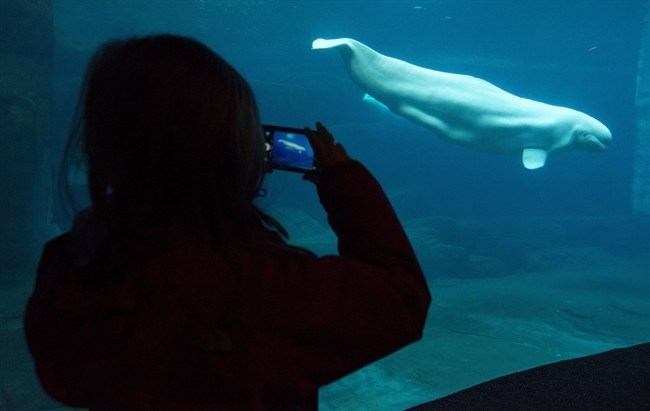
A young girl takes pictures of a beluga whale at the Vancouver Aquarium in Vancouver, B.C., Saturday, Dec. 27, 2014. A Liberal senator is introducing legislation aimed at gradually ending the increasingly controversial practice of keeping whales and dolphins in captivity.
Image Credit: THE CANADIAN PRESS/Jonathan Hayward
June 13, 2015 - 7:00 AM
VANCOUVER - Legislation to end the captivity of whales and dolphins would rob Canadians of vital research meant to defend such animals in the wild, says Vancouver Aquarium's chief executive.
John Nightingale said Liberal Sen. Wilfred Moore's plan to introduce a bill to ban cetaceans in marine parks is misguided because aquariums are essential to understanding the creatures and protecting them from climate change and pollution.
"I think the idea that animals ought to live free in nature is absolutely a natural human emotion, but we believe that is wrong," Nightingale said Friday.
"I am fond of saying I wish we lived in a world where we didn't need places like Vancouver Aquarium, but nature isn't free. Humans are having a bigger and bigger impact ... and we need to do a better job of reducing our impact."
The aquarium is currently undergoing a $100-million expansion including larger whale and dolphin tanks. But it has faced shifting tides of public and political opinion since the release of "Blackfish," a 2013 documentary about the marine park industry.
Two Vancouver Aquarium-owned cetaceans have died this year — Hana, a dolphin who suffered a gastrointestinal disease last month, and Nanuq, a beluga who died after a broken jaw in February while on a breeding loan to Orlando SeaWorld.
Nightingale said both deaths were natural and there is "no evidence" to suggest cetaceans in captivity are any less healthy or active than those in the wild.
Moore told a news conference Thursday that keeping animals that live in large pods in the wild cooped up for entertainment is unjustifiably cruel and disturbing.
His bill would ban captive breeding, imports, exports and live captures of all whales, dolphins and porpoises in Canada, while allowing for the rescue of injured creatures.
Jeffrey Ventre, a former SeaWorld trainer and "Blackfish" cast member, said all marine parks portray themselves as conservation entities contributing to science and education.
"It's mostly a facade," he said. "There might be a small educational component but it's not borne out in the peer-reviewed literature. There's no scientific basis for that claim.
"SeaWorld alone is a multibillion-dollar corporation. It's in the interests of these companies to perpetuate captivity."
Nanuq's death means Vancouver's aquarium now has two belugas, and six are on loan to various SeaWorld facilities in the United States.
SeaWorld veterinarian Dr. Chris Dold said in a recent interview with The Canadian Press that the beluga died of an infection after a broken jaw caused by other whales.
Nanuq, 31 or 32 at the time of his death, had been moved several times to different facilities and arrived at Orlando SeaWorld in May 2014 to live with a group of other belugas.
Dold said trainers didn't see the interaction that broke his jaw, but they do not believe it was aggressive because belugas are highly mobile and interactive animals.
Dr. Naomi Rose, an orca expert and outspoken SeaWorld critic, questioned the assertion.
"For them to assume, even though nobody saw it, that it wasn't anything aggressive is just wishful thinking," said Rose, of the Animal Welfare Institute, based in Washington, D.C.
"It's more likely that it was something unusual ... to muster that sort of force necessary to break a jaw."
— Follow @ellekane on Twitter.
News from © The Canadian Press, 2015